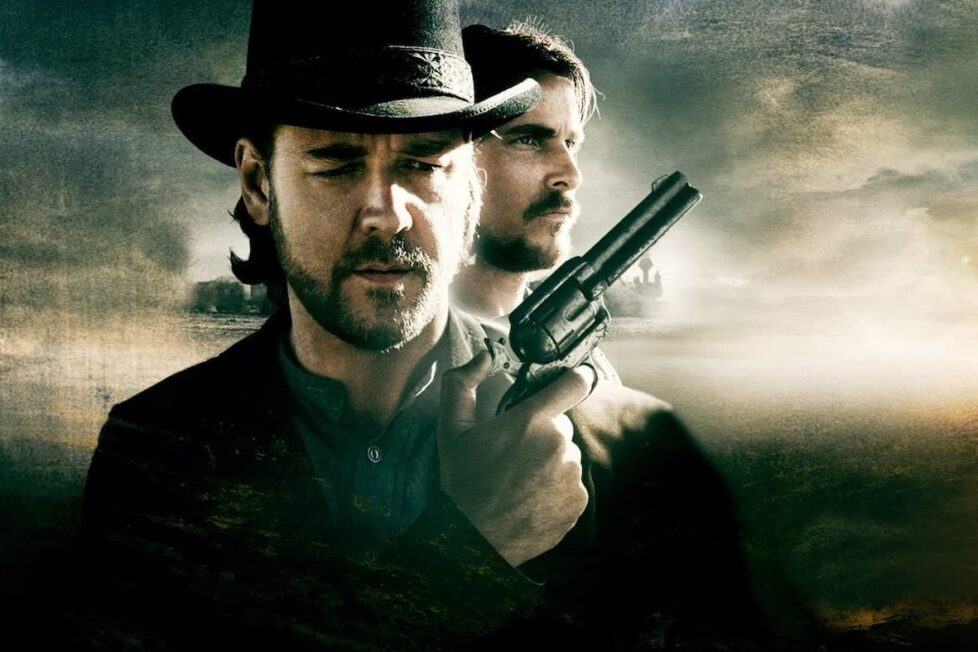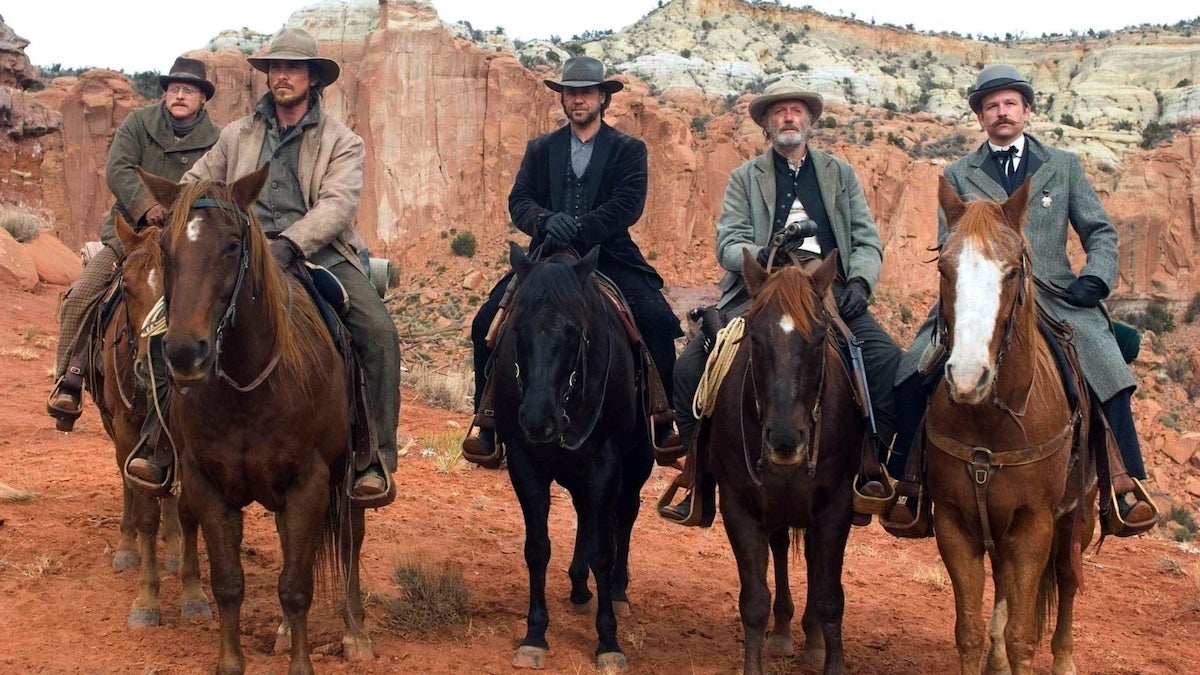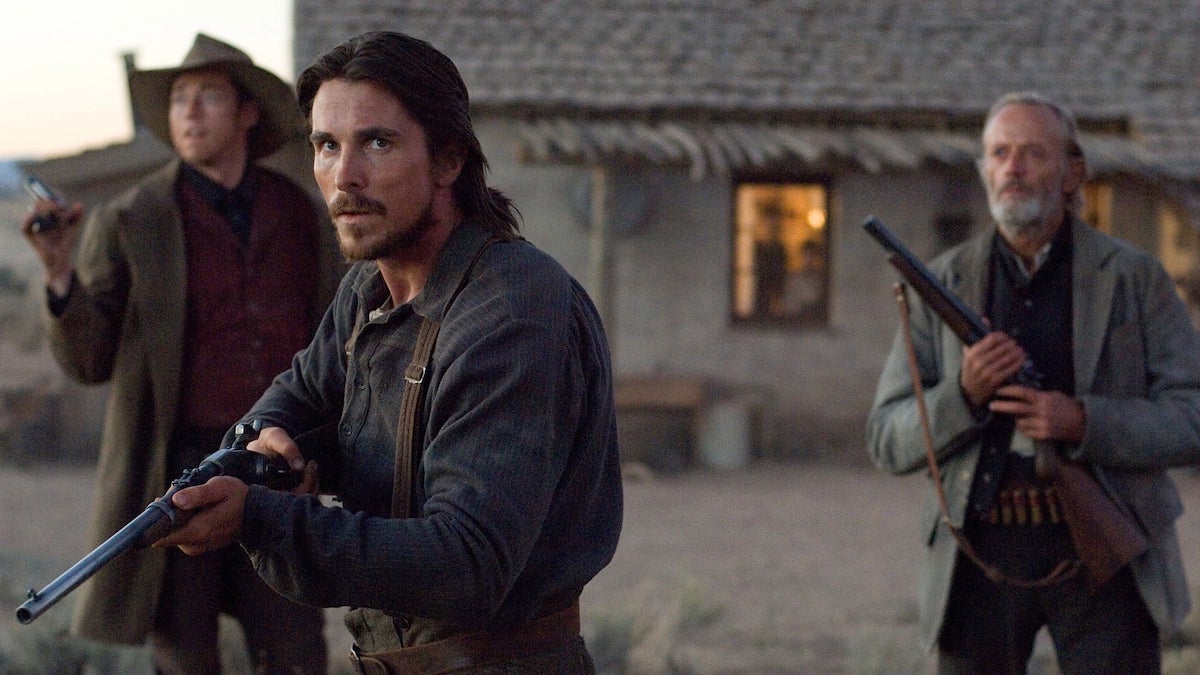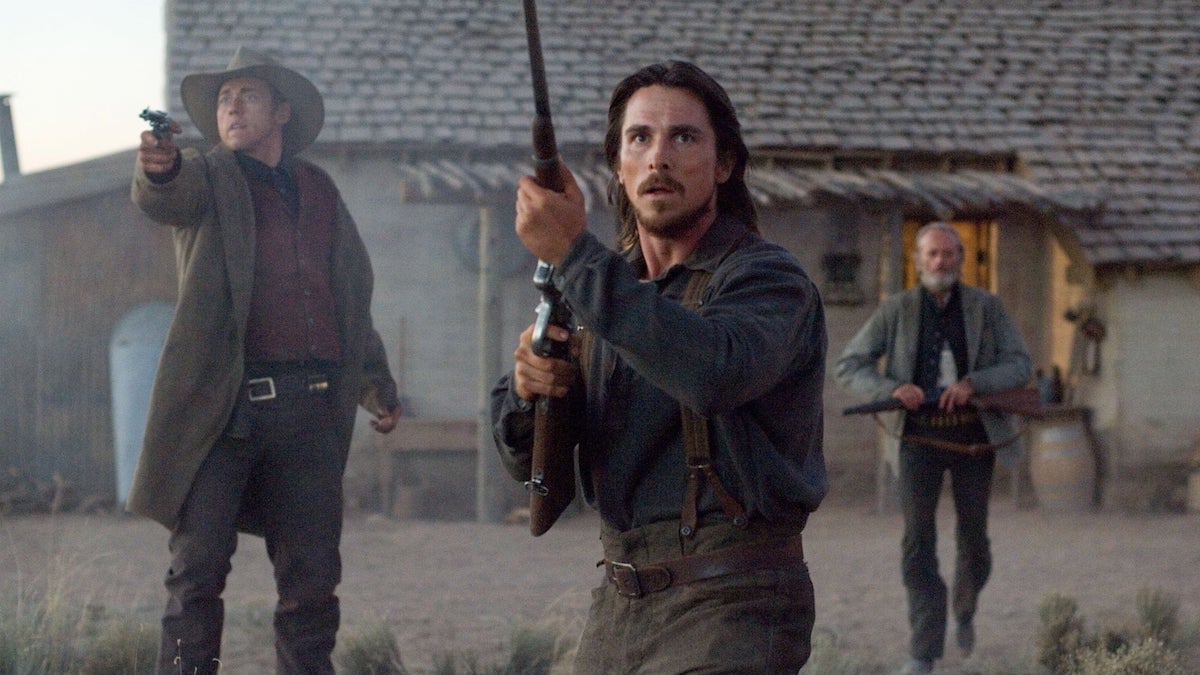3:10 TO YUMA (2007)
Desperate for money, a struggling Arizona rancher takes on the job of escorting a ruthless outlaw to jail.

Desperate for money, a struggling Arizona rancher takes on the job of escorting a ruthless outlaw to jail.


Once amongst the most popular of genres, the western arguably reached its apogee in the 1950s as the definition of Hollywood mainstream; but its decline thereafter was precipitous, even if the arrival of revisionist American westerns (and, from Europe, the spaghetti westerns) in the 1960s and 1970s provided many individually fine films. By the 1980s and 1990s, however, Stetsons and six-shooters were rare sights on the screen.
The occasional noteworthy production still cropped up (1990’s Dances With Wolves, 1992’s Unforgiven), and there was a trickle of remakes of the classics too (1986’s Stagecoach and 2000’s High Noon on television), but it was not really until well into the new century that signs of a revival could be detected.
Deadwood debuted on HBO in 2004, coupling revisionist ideas with the kind of realistic, fully-developed universe that only TV could achieve; Brokeback Mountain (2005) was set in relatively modern times, but laid bare the gay subtexts which had so obviously lurked in the genre for so long; and then by 2007, the year of 3:10 to Yuma, it almost seemed as if a fully-fledged renaissance was underway. Indeed, the release of James Mangold’s movie was briefly postponed to avoid clashing with Andrew Dominik’s The Assassination of Jesse James by the Coward Robert Ford and the Coen Brothers’ No Country for Old Men.

Compared to films like No Country for Old Men or Brokeback Mountain, 3:10 to Yuma is a throwback to the 1950s heyday—and indeed it’s a remake of the 1957 film of the same name, directed by Delmer Daves (unlike Mangold, prolific in this genre). Halsted Welles, credited as screenwriter on Mangold’s film, had actually written the screenplay for the earlier version, and both are based on the same 1953 Elmore Leonard story. There are differences, most notably in the ending and in the way the ’57 movie provides a bigger part for the protagonist’s wife and a smaller one for his son, but essentially they follow the same story.
The film opens in Arizona, near Bisbee, in the mid-1880s (though the movie was filmed in New Mexico). Rancher Dan Evans (Christian Bale) is beset by debt and drought and has fallen behind on his payments to a local businessman, who plans to seize his land and sell it to the advancing railroad. Meanwhile, Ben Wade (Russell Crowe) and his outlaw gang terrorise the area with a series of audacious hold-ups. Evans and his sons encounter Wade while out herding cattle one day, but the criminal doesn’t consider them much of a threat and lets them escape with their lives (though not their horses); Evans then happens to meet Wade again in town, and the first inklings of an unlikely connection between them are already becoming apparent when Wade is arrested.
A team is organised to take the captured Wade to the nearby town of Contention and there put him on the 3:10 train to Yuma, where he can be consigned to the (legendary) jail and, presumably, face the gallows. Evans, although not a lawman, is offered a very welcome $200 to join this group and eagerly accepts; and so off he sets with a small party that includes McElroy (Peter Fonda), an older Pinkerton agent, and the railway’s representative Butterfield (Dallas Roberts) as well as their prisoner. As they cross the desert toward Yuma the bonds and tensions among them are exposed; Wade seems to relate well to some of his captors and indeed to become part of their group, or are they becoming part of his?
Meanwhile, this central narrative of the journey to Yuma is complemented and complicated by the activities of others: Evans’s 14-year-old son William (Logan Lerman) has snuck out to secretly follow them, the Wade gang’s psychopathic Charlie Prince (Ben Foster) is plotting to spring his boss, and there are perils along the way including hostile Apache and vengeful white men.

Although it unsurprisingly concludes with an epic gun battle, as its adherence to the original and to genre conventions demands, 3:10 to Yuma is for the most part a slowish and low-key film (film critic David Thomas called the 1957 version “one of the great talking westerns”). There is something calm even about that final shoot-out, and much of the movie is characterised by quiet conversations, lean dialogue and sparse music, enlivened by a varied range of settings—the Evans ranch, the town of Bisbee, a pass in the hills, an encampment of Chinese railway workers, mostly shot in a palette of yellow, orange and brown that gives the film a permeating sense of heat and dust.
But there are several excellent set pieces as well. The Wade gang’s first ambush is ingeniously staged, involving a coach, two separate groups of bandits, Evans’s cows, Evans himself and his sons, and filmed in a style that (despite 21st-century rapid editing) harkens back to the golden age. Wade’s dinner with the Evans family is suspenseful in a smaller-scale way, while a horseback escape out of the Chinese encampment is thrillingly fast.
Among the cast, most critical praise went to Crowe as Wade (a role taken by Glenn Ford in 1957): clearly more complex than your average western baddie from the moment we first see him, sketching a bird, he’s laid-back and often amused in his manner, magnetic in his appeal (even talking to him is dangerous, people say). And yet he’s not just a misunderstood good guy underneath; when Evans’s son William says “you’re not all bad” Wade replies “yes, I am”, and he has no qualms about justifying his criminal career. “It’s man’s nature to take what he wants. That’s how we’re born.” On the first night of the trip to Yuma, he deliberately provokes Evans and seems to both enjoy and respect the angered violence he arouses.
A more straightforward bad guy is Foster’s Charlie Prince, as compelling to watch in his way as Crowe, and frightening in his casual sadism. Among the other performers, Fonda is memorable as the Bible-reading old bounty hunter and killer-in-the-name-of-the-law McElroy, while Roberts has the dapper, pudgy railroad representative Butterfield (perfectly named) just right: a loyal company man completely out of his natural environment in this violent, barely-settled territory.

Alongside all these, Bale has a hard job giving the character of Evans (played by Van Heflin in the original) much we can grasp onto, and although he embodies a common genre type of the peaceful family man forced by circumstances to reveal new depths of determination, we never understand enough about him beyond that. (“Sometimes a man has to be big enough to see how small he is,” he is dismissively told near the beginning.) A deeper exploration of his relationship with his wife and sons, who seem exasperated by his failings, might have helped. Still, even if the character doesn’t quite satisfy across the movie as a whole, in individual scenes his taciturn manner is convincing; he is a good foil for Crowe, and the half-mistrustful, half-intrigued chemistry between them is successful.
Strong box office performance and enthusiastic reviews (although the film received only two relatively minor Academy Awards nominations, one for Marco Beltrami’s score and the other for sound mixing) led some to wonder if 3:10 to Yuma might herald a return to the mainstream for the western. That didn’t happen, and although there continue to be outstanding entries—such as The Revenant (2015) and The Power of the Dog (2021)—a western movie on the big screen is still a rare thing.
But 3:10 to Yuma remains one of the best of the last few decade’s westerns, managing to embrace traditional values while acknowledging enough of the revisionist approach that it doesn’t seem self-consciously old-fashioned (“moral ain’t got a damn thing to do with it”, says a character at the Chinese encampment, effectively encapsulating most of what came after the 1960s in one line).
Add in Crowe’s performance, some watchable actors in secondary roles, impressive action sequences, and a sense of danger that never lets up yet never feels artificially manufactured, and the result is a film that, if not a classic, can easily hold its own with westerns of any age.
USA | 2007 | 122 MINUTES | 2.35:1 | COLOUR | ENGLISH


director: James Mangold.
writers: Halsted Welles, Michael Brandt & Derek Haas (based on the short story ‘Three-Ten to Yuma’ by Elmore Leonard).
starring: Russell Crowe, Christian Bale, Logan Lerman & Peter Fonda.
